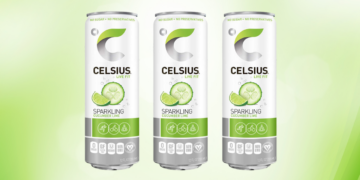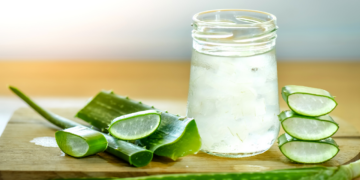Lemon, and other citrus fruits, are popular choices for making quick drinks, no surprise since these citrus fruits have numerous health benefits.
So we know that adding a splash of lemon and lime to water can be healthy. But what about lemonade? Is lemonade just as healthy and good for you?
Lemonade can be a healthy source of vitamin C; after all, just one lemon contains 40% of the total recommended value. However, lemonade as a beverage often has a lot of sugar and salt. When consumed in excess, both are linked to obesity, high blood pressure, and diabetes.
Let’s explore all about lemonade, starting with analyzing what exactly is in a glass of lemonade.
What’s In A Glass Of Lemonade?
A traditional glass of lemonade recipe includes
- Freshly squeezed lemon juice; concentration usually depends on taste preferences.
- Sugar
- Water
- Salt: a pinch of salt helps balance out the sweetness and the tartness of the drink.
- Ice
A medium-sized lemon (58g) contains:
- Calories= 15
- Potassium= 75 mg (2% of daily requirement)
- Vitamin C= 40% of the daily requirement.
- Carbohydrates= 5 g (2% of daily requirement)
- Dietary fibre= 2g (8% of daily requirement); if you are keeping the pulp.
- Natural sugars= 2g
Sugar is a source of energy. The regular table sugar consists of sucrose and glucose, which your body can quickly break down in the body. One teaspoon of sugar provides approximately 16 Calories.
Salt is (sodium chloride) NaCl— 40% sodium and 60% chloride. Salt is the major source of sodium and chloride, two of the most important electrolytes in our body. In some regions, salt is fortified with iodine as well. One teaspoon of salt contains 2300 mg sodium, slightly more than the recommended daily requirements (2000mg).
Water needs no introduction; the human body is 60% water.
What are the Benefits of Drinking lemonade?
Can be A Great Source of Vitamin C
Citrus fruits, including lemon, are rich in vitamin C and other citrus flavonoids and potent antioxidants. Antioxidants neutralize the free radicals that are produced in our bodies. These free radicals cause DNA damage and are often linked to cancer, arthritis, heart diseases, neurodegenerative diseases, and many other diseases.
Another vital role vitamin C plays is in boosting immunity. Good immunity, for example, determines how often you’ll catch a common cold and how long it will take for you to recover from it.
In addition, vitamin C promotes the production of collagen in our bodies. Collagen is responsible for skin elasticity. As we age, the collagen content from our skin reduces; this is when wrinkles start appearing—consuming vitamin C-rich food can help delay this process.
A Great Way to Stay Hydrated
For a healthy body, a healthy amount of hydration is a must. Since the human body is 60% water, it is essential to maintain this hydration level and maintain adequate functioning of our body.
The importance of staying hydrated cannot be overstated. The symptoms of dehydration can range anywhere from feeling thirsty, dizziness, tiredness to even coma and death in severe cases. Although you most likely won’t develop severe dehydration in a typical scenario, mild dehydration can affect your energy levels and cognition.
Drinking liquids, even lemonade, can help you reach your hydration goals, especially if you are not fond of plain water. If you are looking for ways to flavor your water, check out this article we wrote on the natural ways to flavor water.
A Great Source of Energy
Sugar is the most readily available form of energy. Since lemonade contains sugar, it can act as a no-caffeine natural “energy drink.” An ice-cold lemonade made of freshly squeezed lemon juice and sugar would be an effective short-term energy booster, especially for the caffeine-sensitive.
Our brain requires a constant supply of glucose to function well. Half of the total body energy (i.e., glucose) is used by our brain alone. Therefore, a low blood sugar level can severely impact our brain function and affect our thinking ability, memory, learning, and attention.
That said, sugar is a double-edged sword. Sugar is a simple carbohydrate and will cause a sudden spike of sugar in your bloodstream if consumed in excess. Drinking too much sugary lemonade is not recommended. If you choose to make your lemonade at home instead of buying it, you can control the amount of sugar you add to it. Just remember, sugar is not harmful when used judiciously.
It Has the Potential to Replace Your Commercial Sports Drink
A glass of lemonade contains every important electrolyte that a standard sports drink contains. Sodium and potassium are the two significant electrolytes lost in sweat during exercise, and therefore, these are the electrolytes that form the base of a typical sports drink. In addition to this, some brands add sugar to provide for the energy requirements.
If you go through the contents of a lemonade mentioned at the beginning, you can see lemon provides for potassium, salt provides for sodium, and sugar provides for energy requirements. The only modification would be to add a dash of salt (0.4 g) to your lemonade instead of a pinch. Also, you can skip adding sugar if your workout session doesn’t require an additional boost of energy. By adjusting the proportion of your lemonade ingredients a little bit, you can create your own homemade sports drink for your workout sessions.
It May Help Prevent Kidney Stones
Drinking lemon juice is one of the proven ways to prevent kidney stones naturally. Kidney stones are formed when there is a supersaturation of the urine. This supersaturation allows various compounds to settle down, combine, and form crystals. These crystals eventually increase in size over time and form kidney stones.
Drinking a lot of fluids is the most effective preventive measure for kidney stones. Lemon juice, specifically, is beneficial for the prevention of calcium oxalate stones. This health benefit is attributed to the citric acid component of lemon because it binds with the urinary calcium and prevents supersaturation. Citric also binds with calcium oxalate crystals and prevents them from getting bigger. In fact, a study suggests that 60% of the patients with calcium oxalate stones have hypocitraturia (a deficiency of citric acid in the body).
As lemonade is fresh lemon juice plus water, it makes a great drink for flushing the kidneys and preventing kidney stones.
What are the Problems Of Drinking Too Much Lemonade?
Too Much Sugar
Drinking a couple of glasses of lemonade each day is fine, but if you are drinking a lot of lemonade loaded with excess sugar, that’s a problem. As mentioned earlier, sugar is a double-edged sword and is only good when used in moderation.
It is very easy to overdo the sugar; in fact, your body wants you to. Any amount of sugar causes a spike in our blood sugar levels. When the blood sugar level goes up, our body starts producing insulin to tackle it. Once insulin is in circulation, the blood sugar quickly goes down again. And when this happens, you very quickly begin craving sugar even more. This cycle can be endless and will eventually cause weight gain.
So, how can you tackle this? is all hope lost? Sugar in moderation is okay, especially if you do not have diabetes. That said, we would all benefit from limiting sugar in the drinks we consume daily.
May Damage Your Teeth
Lemon juice is acidic. The acid part of lemon juice can erode your tooth enamel and make your teeth prone to tooth decay and sensitivity.
Additionally, simple carbohydrates like sugar also promote tooth decay in general.
To tackle this:
- Rinse out your mouth after drinking lemonade.
- Avoid brushing your teeth for at least 30 mins. Your enamel softens up a little bit after you drink acidic juices. Brushing your teeth too early can be pretty abrasive.
Be Careful With the Salt Intake
If you like salt in your lemonade, you should only be adding a pinch of salt to your drink.
The maximum recommended intake of salt is 5g, equivalent to 1 teaspoon of salt per day.
If you consume a lot of packed foods, fast foods, and take-outs, chances are you are already consuming a much higher amount of salt than recommended. So, you may want to control how much salt you are adding to your lemonade or control how often you are drinking lemonade.
Remember that a high salt intake causes benign symptoms like fluid retention initially but can lead to serious health issues like hypertension, heart diseases, and strokes.
How Much Lemonade Should I Drink a Day?
Since overdoing salt and sugar is so easy, it is vital to watch your lemonade intake.
To avoid any side effects related to lemonade, keep a limit of 2-3 glasses of lemonade at most per day,
While preparing lemonade, strictly add only one teaspoon of sugar, and a pinch of salt. If you would like to make it sweeter, add in other sugar alternatives.
Four ounces of lemon juice should be your upper limit for lemon juice each day. As per research, drinking 4 ounces of lemon juice is enough to prevent kidney stones. You do not need to overdo it.
Conclusion
Lemonade is a very healthy drink, and you can prepare your own lemonade at home with just a few ingredients. But just like for most things, moderation is the key. Drink a lot of water, and add feel free to add some lemonade here and there to your diet for additional benefits.
Water is irreplaceable. You can add flavors to your water to make it more appealing or consume fluids in other ways, but it is most likely not a good idea to be replacing most of your water intake with lemonade.







